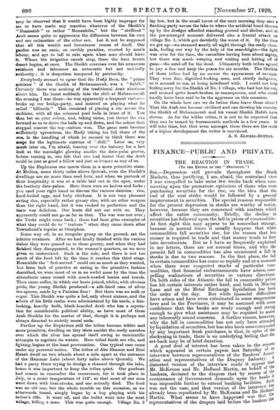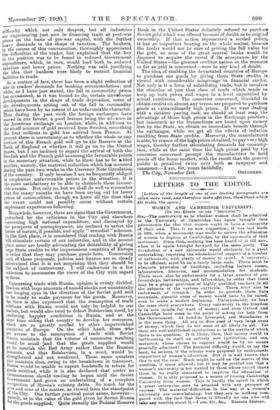FINANCE—PUBLIC AND PRIVATE.
THE REACTION IN TRADE.
[To THE EDITOR OP THE " SPECTATOR:1
Sfa,—Depression still prevails throughout the Stock Markets, thus justifying, I am afraid, the restrained view
I was compelled to take some few weeks back when com- menting upon the premature optimism of those who were purchasing securities for the rise, on the idea that the end of the coal strike would be followed by a general improvement in securities. The special reasons responsible for the present depression in stocks are worthy of notice, however, because they are concerned with matters which affect the entire community. Briefly, the decline in
securities has followed upon the fall in prices of commodities.
At first sight this may appear to be somewhat strange, because in normal times it usually happens that when
commodities fall securities rise, for the reason that less
money is required in trade and that money tends to flow into investments. But as I have so frequently explained
in my letters, these are not normal times, and why the present fall in commodities has also occasioned a fall in stocks is due to two reasons. In the first place, the fall in certain commodities has come so rapidly and at a moment when there were congested stocks of particular com- modities, that financial embarrassments have arisen, com- pelling realizations of securities in various directions. On both sides of the Atlantic the fall in commodity prices has hit certain interests rather hard, and both in Mincing
Lane and on the Metal Exchange liquidation has been
the order of the day. But while financial difficulties have arisen and have even culminated in some suspensions here and in the Provinces, it may be assumed with some confidence that the banks are ready enough and strong enough to give what assistance may be required to assist any inherently sound concerns. A further reason, however, why the fall in commodities has not only been attended by liquidation of securities, but has also been unaccompanied by any important fresh purchases, is that, in spite of the slackening in trade, there is an underlying feeling that the Bet-back may be of brief duration. A good deal of interest has been taken in the reports which appeared in certain papers last Saturday of a?'
interview between representatives of the Bankers' Associ- ation and representatives of the Drapery Industry. A distorted version of the interview made it appear that Mr. McKenna and Mr. Holland Martin, on behalf of the bankers, declared to the drapers that by reason of fir continuance of Government demands upon the banks, 4 was impossible further to extend banking facilities. hurl was not the case, and that version of the interview bald already been repudiated by Mr. McKenna and Mr. 1[°1111 Martin. What seems to have happened was that representatives of the drapers laid before the hankers difficulty which not only drapers, but all industries are experiencing just now in financing trade at post-war prices on the basis of pre-war capital, with the further Leavy demands in the shape of taxation. The bankers, fa the course of this conversation, thoroughly appreciated the difficulties of the trader, but explained that the key to the position was to be found in reduced Government expenditure, which, in turn, would lead both to reduced taxation and lower prices. Nothing was said justifying the idea that bankers were likely to restrict financial facilities to trade.
As a matter of fact, there has been a slight reduction of late in traders' demands for banking accommodation ; and while, as I have just stated, the fall in commodity prices hes occasioned, as it was bound to do, certain unwelcome developments in the shape of trade depression, some of the developments arising out of the fall in commodity prices have been by no means of an unfavourable character. Thus during the past week the foreign exchanges have moved in our favour, a good feature being the advance in the American exchange on London, while, in addition to the small amount of gold received from. Sweden something like four millions in gold has arrived from France. At present there is uncertainty as to whether the whole or any portion of this French gold will go to the Reserve at the Bank of England or whether it will go on to the United States, but I am inclined to regard the arrival of both the Swedish and the French gold as among the favourable points in the monetary situation, while to these has to be aided another, namely, the material reduction which has occurred during the past two weeks in the Currency Note Circulation of the country. If only because I am so frequently obliged to emphasize unfavourable points in the situation, it is the more satisfactory to be able to chronicle these favour- able events. Not only so, but we shall do well to remember that for many months we have been crying out for lower prices of commodities, though we knew all the time that the event, could not possibly occur without certain unpleasant experiences following.
Meanwhile, however, there are signs that the Government, perturbed by the criticisms in the City and elsewhere concerning high national expenditure, and dismayed by the prospects of unemployment, are inclined to arrest the forces of nature, if possible, and apply "remedial "schemes. In the first place, it is considered that trading with Russia will stimulate certain of our industries, and in the second place some are loudly advocating the desirability of giving large State credits to the impecunious countries of Europe in order that they may purchase goods here. Concerning both of these proposals, politics and finance are so closely intertwined that it is not surprising that they should be the subject of controversy. I will endeavour in a few sentences to summarize the views of the City with regard to them.
Concerning trade with Russia, opinion is evenly divided. Traders with large amounts of unsold stocks not unnaturally east longing eyes in the direction of the Soviet gold said to be ready to make payment for the goods. Moreover, the view is also expressed that the resumption of trade relations with Russia would not only be helpful to our traders, but would also tend to defeat Bolshevism itself, by Producing happier conditions in Russia, and at the same time aiding that country to develop her resources, Which are so greatly needed by other impoverished countries of Europe. On the other hand, those who are averse to the resumption of trade with Soviet Russia main' tam' that the volume of commerce resulting Would be small rand that the goods supplied would go to nourish the Red Array rather than the Russian Peasants, and that Bolshevism, in a word, would be strengthened and not weakened. These same quarters also, maintain that, owing to the breakdown in transport, ituseia would be unable to export foodstuffs in return for Pods received, while it is also declared that under no cumstances should trading be begun until the Soviet uovernment had given an undertaking of a complete teeognition of Russia's existing debts. So much for the Pros and cons of the matter, as viewed from the standpoint of the City. One further practical point arises, however— as to the value of the gold given by Soviet Russia air the goods supplied. Quite recently the Federal Reserve Bank in the United States definitely refused to purchase Soviet gold which was offered because of doubt as to original ownership. If that action represented a settled policy, it has an important bearing on the whole matter, because the trader would not be sure of getting the full value for the gold, as none of the great central banks would be disposed to acquire the metal if its acceptance by the United States—the greatest creditor nation at the moment so far as gold is concerned—were in any kind of doubt. The idea of enabling the devastated countries of Europe to purchase our goods by giving them State credits is viewed with considerable misgivuigs in financial circles. Not only is it a form of subsidizing trade, but it involves the stimulus of just that class of trade which tends to keep up both prices and wages to a level unjustified by actual conditions. The countries concerned, thankful to obtain credits on almost any terms, are prepared to purchase goods at extraordinarily high prices. If we were dealing. with a country paying cash, we should at least reap the advantage of those high prices in the Exchange position ; but inasmuch as the transactions are based upon money lent by the State, we obtain no immediate benefit through the exchanges, while we get all the effects of inflation resulting from State credits. Moreover, the manufacturer is able, by reason of the high prices obtained, to pay very high wages, thereby further stimulating demands for consump- tion, while at the same time the high prices paid by the countries concerned prompt the manufacturer to hold goods off the home market, with the result that the general public is penalized twice over both as taxpayer and consumer.—I am, Sir, yours faithfully, The City, November 24th. ONLOOKER.







































 Previous page
Previous page